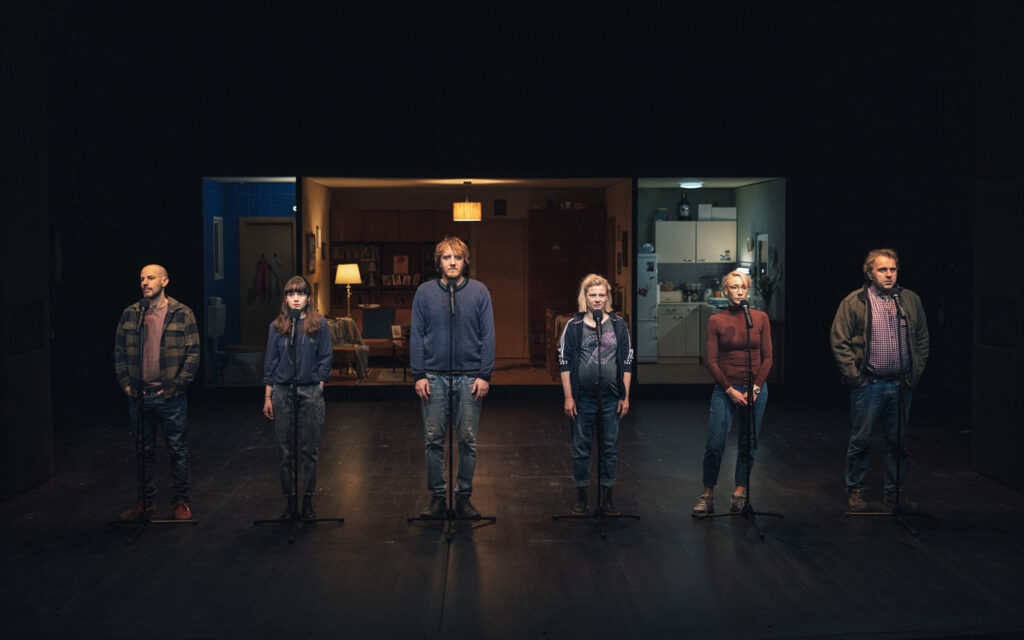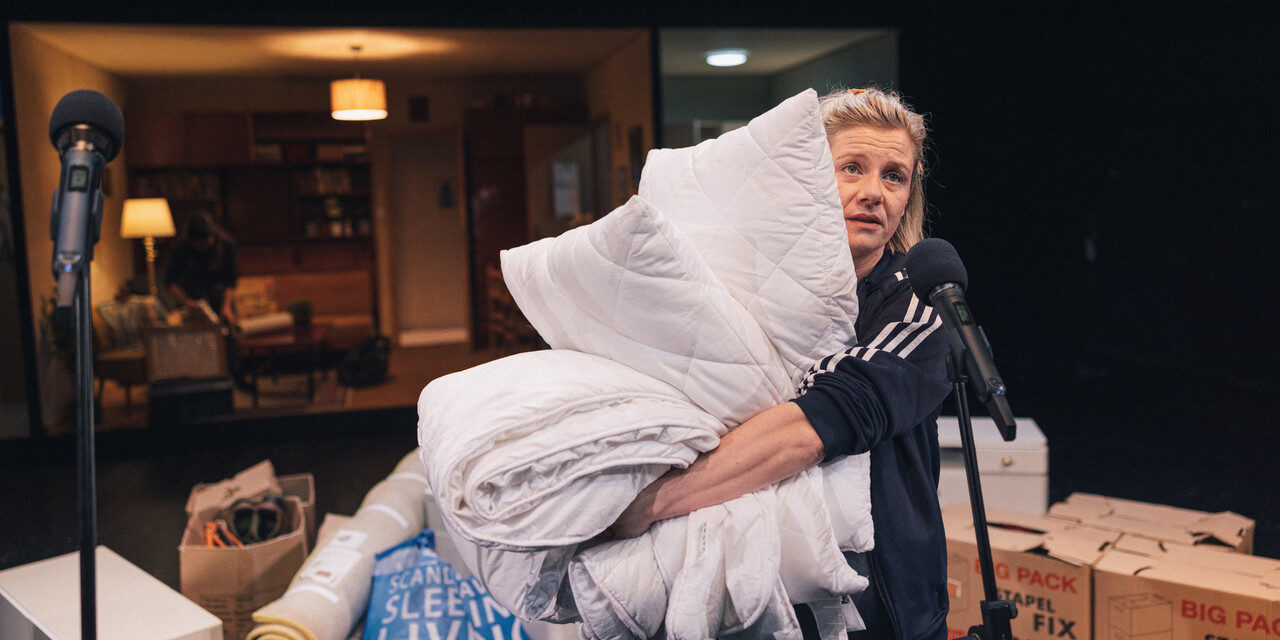Ljubljana City Theater (part of 58th Maribor Festival)
A woman (Mirjam Korbar) sits alone in her apartment. She looks around at her home. She thinks back wistfully on her life, on the mother she was close to but didn’t know, not well, not deeply. Theirs was not an emotional relationship. We notice she is wearing a hospital gown. Then she exits the stage, and the world.
Sediment, which sees playwright and dramaturg Katarina Morano working with regular collaborator Žiga Divjak, is an exploration of the things we leave behind us. Once the immediate shock of grief has subsided, the woman’s three children – pregnant Mila (Jana Zupančič), unmarried Blaž, (Iztok Drabik Jug) and oldest Janja (Mojca Funkl) – must sort through and pack up their mother’s apartment, dredging up memories along with the dust.
Divjak and Morano’s production is one in which directorial concept and text work in harmony with one another. Designer Igor Vasiljev has created a richly detailed, three-room apartment – a bathroom, a living room and kitchen complete with working sink. The apartment is filled with mid-20th century Yugoslav furniture, books, pictures, plants, photo albums and knick-knacks – the stuff accumulated over the course of a lifetime. Over two hours, the family will strip the apartment bare, loading possessions into boxes, dismantling furniture, quibbling over who gets to keep which of their mother’s books.
At the start of this process, six microphones are placed at the front of the stage, outside the apartment set, and the actors will often step forwards and speak into them, addressing the audience even when the characters are speaking to each other.
The dialogue mixes moments of emotional clarity with more banal family banter. Reminiscences intermingle with bickering about the dishwasher or the best place to park the car. Sudden pangs of regret coexist with discussions of when the recycling centre closes. It’s like a kind of conversational collage, in which a moment of fleeting melancholy – Janja expresses her sadness that she didn’t learn enough from their mother while she had the chance – is followed almost immediately by a conversation about the colour and consistency of Mila’s kid’s poop (“maybe they ate beetroot?”).

Sediment., Gledalisce MGL
The writing successfully captures the pattern of everyday conversation, the minor squabbles, the little digs and criticisms. It is nuanced and often funny – if slightly too reliant on talk about bowel movements for humour. The ensemble cast also perfectly grasp the particular rhythms of the text, with Matej Puc as Mila’s husband Grega, adding a note of comedy.
Gradually we gain insights into the dynamics and tensions that exist between the siblings and their partners. Disconnection is a running theme. Though the family occupy the same space, there is a distance between them, something enhanced by the way in which the dialogue is delivered into microphones – the lack of natural interaction.
That’s not to say it’s devoid of emotional texture: there are outbursts of temper and moments of levity. Sometimes we also gain access to the characters’ inner thoughts as they deliver monologues. Mila is worried that she’s becoming the kind of mother that she didn’t want to be, forever nagging and telling off her kid for minor misbehaviour. Janja’s husband Tomaž (Lotos Vincenc Šparovec) is convinced that he has only 13 years left to live, that like his father and grandfather before him, he will die in his 50s. The slightly feckless Grega fondly remembers a business trip to Paris where instead of seeing the sights he holed up in his hotel room with some beers and watched TV. Blaž delivers a long, meandering, perhaps unintentionally revealing monologue about his dog.
These are things they can’t express to each other. There’s a prevailing sense that an inability to be truly intimate, to confide in one another, and be emotionally open, has been passed down along with the apartment, a generational legacy.
Furniture and boxes slowly pile up around the stage as the set behind becomes emptier and emptier. Vasiljev has even included pale patches on the walls when the pictures are removed that give a sense they were hanging there for years. The sofa their mother was so protective of in life that she would not let her kids sit on it if they were drinking water is taken apart. What was once a home, is reduced to a box, a shell. Divjak doesn’t stop there, however; the dismantling continues. The flat is taken apart piece by piece by stage crew with drills. The ceiling disappears, then the walls, one by one, until there is nothing left.
It’s an effective device, a visual encapsulation of the process taking place. And it’s interesting to see Divjak’s conceptual style applied to a work that is not explicitly eco-themed or focused on another pressing social issue. Yet, of course, this kind of family baggage, this messy inheritance, is part of the fabric of the world in which we live. The domestic is political, and has ever been so.
This is illustrated in a bookend to the opening scene – which looked to the past – in which Lana, Janja and Tomaž’s teenage daughter, (Lara Wolf) who has mostly got on with the business of packing and cleaning (except to express a wish to take a year out to travel which immediately causes her mother to freak out, not really listening to her explanation) expresses her confusion about the future, her worries about the world that’s been handed down to her. She fears that many of the things her parents took for granted are no longer an option for her, that it is too late. What good does it do to agonise over buying a bottle of water on a hot day while people have private jets? What is left for her?
Credits:
Author and dramaturgy: Katarina Morano// Director Žiga Divjak//Set designer Igor Vasiljev//
Costume designer: Tina Pavlović//Composer: Blaž Gracar//Light designer: Andrej Koležnik//
Sound designer: Gašper Zidanič
For further information, visit: mgl.si
Further reading: interview with Žiga Divjak: “We must completely change our value system“
Natasha Tripney is a writer, editor and critic based in London and Belgrade. She is the international editor for The Stage, the newspaper of the UK theatre industry. In 2011, she co-founded Exeunt, an online theatre magazine, which she edited until 2016. She is a contributor to the Guardian, Evening Standard, the BBC, Tortoise and Kosovo 2.0








